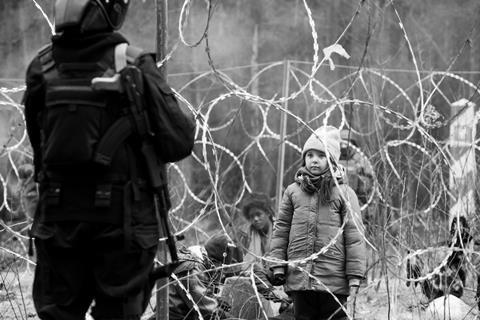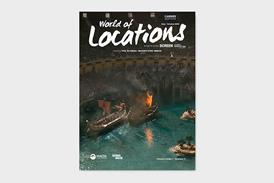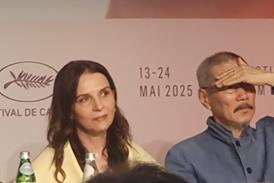
Poland’s arthouse cinemas are refusing to show a government propaganda spot before each screening of Agnieszka Holland’s Green Border.
The move comes after Poland’s deputy interior minister, Blazej Pobozy, announced last week that a 30-second spot entitled “Safe Poland” would be distributed to the country’s arthouse cinemas to be shown before what he described as “this disgusting lampoon.”
Pobozy unveiled details of the spot at a hastily convened press conference on September 21, a day before Green Border’s general release by Kino Swiat in 230 cinemas throughout Poland.
In the spot, a narrator off-screen recalls that “in 2021, a hybrid operation aimed at Poland [by Belarus and Russia] began. The services subordinated to the Ministry of Interior and Administration passed the test and stopped the attack on our border. A few months later, to increase the security of our country, a modern barrier was built on the border.”
Holland’s Green Border, which won the special jury prize at Venice, tells the story of refugees, charity workers, activists and border guards, whose lives intersect in the cold, swampy forests between Poland and Belarus. Holland and the film have become the focus of a string of attacks by Polish government ministers, including President Duda who has compared the film to Nazi propaganda.
No legal basis
Speaking to the OKO.press website, lawyer Emilia Barabasz said that she was “not aware of any direct legal basis” on which Poland’s interior ministry could order arthouse cinemas to play the spot.
“The question is whether arthouse cinemas will be willing to show the spot and what might encourage them to do so. It should be remembered that the Polish Film Institute operates on the basis of the Cinematography Act which financially supports the Association of Arthouse Cinemas. Perhaps this is the path we should follow when looking for a way in which the Ministry wants to encourage arthouse cinemas to show their spot.”
In an interview with Screen last week, Agnieszka Holland described the ministry’s measure as “ridiculous. Have you ever heard of something like that? I think Poles are not duped…I don’t know how they can force the cinemas to screen it. I imagine they are paid spots. All this stuff is crazy. It’s crazy, but at the same time it’s dangerous.”
’Artistic creation does not need political guidelines’
The management board of Poland’s Association of Arthouse Cinemas (SKS) didn’t waste any time in responding to Pobozy’s announcement.
SKS issued a statement the same day (Sep 21) noting that “cinemas associated with the Association are run by entities independent of the Association of Arthouse Cinemas, which decide on their own about all aspects of their activities, including the film repertoire and advertising spots displayed.”
The SKS network of 241 arthouse cinemas includes the Pionier in Szczecin, one of the world’s oldest functioning cinemas, Cracow’s Kino pod Baranami, the nine-screen Cinema New Horizons in Wroclaw, and Kino Muza which hosted the second edition of the Outfilm Poznań Festival at the beginning of this September.
Roman Gutek, founder of the distribution company Gutel Film, owner of Kino Muranów in Warsaw and president of the New Horizons Association, told WirtualneMedia.pl that he refused to show the “tendentious” spot in his cinemas.
“Artistic creation does not need any political guidelines or imposition of interpretation before its confrontation with the recipient,” he declare.
“Poland is in the eyes of the whole world again, unfortunately for not very good reasons. It is not the film The Green Border that is harming Poland, but what is happening around this film, including the compulsion to show the propaganda spot in cinemas.”
In a Facebook post on the day of The Green Border’s general release on Friday (Sep 22), the Cinema New Horizons announced: “You will not see the MSWIA [Ministry of Interior and Administration] spot before the screenings of The Green Border. At the same time, we would like to emphasise our solidarity with Agnieszka Holland, who been a guest at our cinema on more than one occasion. We look forward to further meetings with the director in the future.”
Similarly, the Forum cinema in the town of Bialystok, just 50 kilometres from the border with Belarus, screened a 10-minute animated documentary There Are People In The Forest by young local filmmaker Szymon Ruczyński instead of the spot when Holland attended her film’s screening on Friday evening (Sep 22).
Protests and counter-protests
There has been a relentless orchestrated media campaign against Holland and her film through the state-run national broadcaster TVP and other media outlets supportive of the ruling Law and Justice (PiS) part.
Some of the first screenings of Green Border on Polish soil have been the subject of protests following the government’s campaign against the film.
Members of the local All-Polish Youth organisation gathered with banners declaring “Poland is a country for Poles” and “Putin thanks Agnieszka Holland” ahead of the Thursday night screening at Cracow’s Kino pod Baranami. The Families Without Borders group and other activists countered with such slogans as “Stop violence at the border” and “Free art without censorship.”
The right-wing protestors also held up an image of Holland’s face with a “Z” in Russian colours and a photo of her in the company of Putin and Lukashenko with Lenin, Marx and Engels in the background.
The All-Polish Youth organisation also picketed screenings at the Helios Cinema and Forum Bialystok Cultural Centre on Friday night with placards reading “Holland. Shame on You” and “Holland. How much did Putin pay you?”, among others.
There was also a brief tussle in the foyer of the Helios Cinema between members of the All-Polish Youth and bodyguards escorting the director into the cinema hall, with Sovereign Poland party member Sebastian Lukaszewicz holding up a cardboard copy of an Aeroflot ticket for Warsaw to Moscow and others shouting “To Putin!”.
Green Border will be one of the films to be presented in the “Focus - Ukraine-Poland” sidebar during the seventh Kyiv Critics Week (12-18 October).
This section is being supported financially by the Goethe Institut’s stabilisation fund and has the Polish Institute in Kyiv, which is under the auspices of the Polish Ministry of Foreign Affairs, as a partner.


































No comments yet